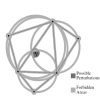
Controlled Perturbation for Delaunay Triangulations
Stefan Funke, Christian Klein, Kurt Mehlhorn, Susanne Schmitt
Most geometric algorithms are idealistic in the sense that they are designed
for the Real-RAM model of computation and for inputs in general
position. Real inputs may be degenerate and floating point arithmetic is
only an approximation of real arithmetic.
Perturbation replaces an input by a nearby input which is (hopefully)
in general position and on which the algorithm can be run with floating point
arithmetic. Controlled perturbation as proposed by Halperin et al. calls for
more: control over the amount of perturbation needed for a given precision of
the floating point system. Or conversely, a control over the precision needed
for a given amount of perturbation. Halperin et al. gave controlled
perturbation schemes for arrangements of polyhedral surfaces, spheres, and
circles.
We extend their work and point out that controlled perturbation is a
general scheme for converting idealistic algorithms into algorithms which can
be executed with floating point arithmetic. We also show how to use controlled
perturbation in the context of randomized geometric algorithms without
deteriorating the running time. Finally, we give concrete schemes for planar
Delaunay triangulations and convex hulls and Delaunay triangulations in
arbitrary dimensions. We analyze the relation between the
perturbation amount and the precision of the floating point system. We also
report about experiments with a planar Delaunay diagram algorithm.
PDF
